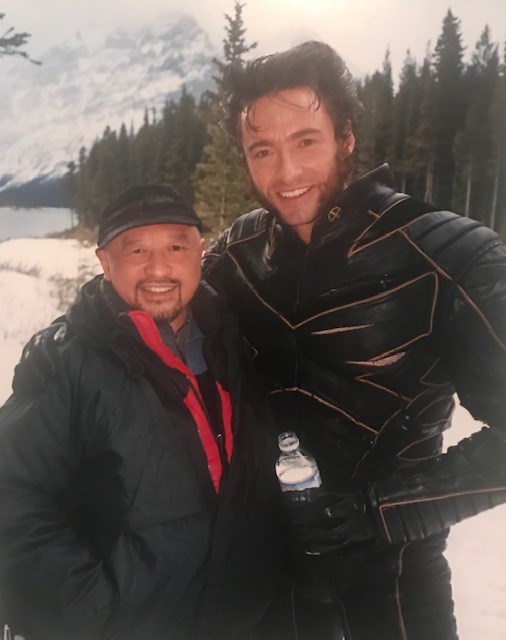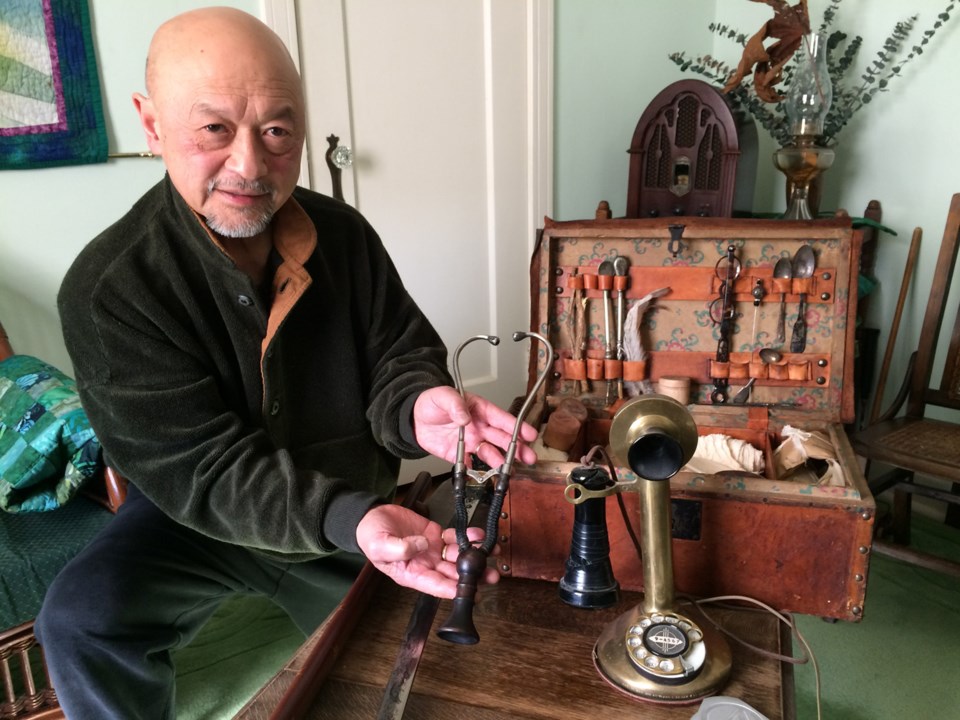It all started one long-ago Christmas Eve, when he took a shift at CBC studios in downtown Vancouver.
His job? Cleaning off the blackboard that was used for the weather forecasts.
Jimmy Chow had no inkling, then, of the direction the next 45 years would take. And he certainly couldn’t have imagined that, come 2019, he’d be sitting in the rec room of his Burnaby home, watching more movies than he could count so he could cast his votes for the 91st Academy Awards.
Chow, who’s now mostly retired from a long career as a props master in the film industry, is a newly named member of the Academy of Motion Picture Arts and Sciences. The group, whose votes determine the nominees and winners of the Oscars every year, has some 8,000-plus members in more than 60 countries around the globe. It’s made up of those who, as the Academy’s website says, have “demonstrated exceptional achievement in the field of theatrical motion pictures.”
Chow, chatting over coffee at his Metrotown-area home, admits the Academy membership came his way out of the blue.
A production designer he’d known for years put his name forward – part, Chow says, of the Academy’s attempt to become more inclusive by accepting more women and people of colour. Chow agreed to stand for membership and sent his resumé off on a whim, not really thinking much of his chances. It was months before he heard back and learned that, yes, he’d been accepted – one of only 162 Canadians, and six Asian-Canadians, to belong.
Chow shows off the large box of DVDs that studios have sent his way, looking for his vote.
“It is a lot of work, but at my age, at 70? It’s great,” he says, laughing that the movie-watching has been a great way to cope with rainy and snowy weather. (But no, he hasn’t been entirely a couch potato; he’s interspersed it with trips over to nearby Bonsor Recreation Complex, where he plays badminton.)
WHERE IT BEGAN
Chow cheerfully admits his long career in the film industry came about largely by accident.
“I was always trying to not be Chinese,” he says with a laugh. (He moved to Canada with his family in 1950, when his parents were forced to leave China.) “My parents wanted me to be a doctor, or some sort of businessman with a degree.”
Chow, though, gravitated more to the arts, and he originally studied social work at Â鶹´«Ă˝Ół»Community College. When he decided he didn’t want to do a degree in social work, he found himself at a bit of a crossroads until a friend suggested he apply to the CBC, and he figured he might as well give it a whirl.
He heard nothing for a long time. Then came a phone call that fateful Christmas Eve, when no one wanted to work and Chow picked up one shift. He picked up another one a week later, on New Year’s Eve. Which led to a part-time job and, eventually, to full-time work.
His first major project? The Beachcombers.
“They just threw me in there,” laughs Chow. He worked as a set decorator, alongside another decorator and the art director - doing a job, he says, that would be done by at least six times that many people in today’s world.
“We did everything – cars, planes, explosions,” he says. “I spent three years there; that was school for me.”
He’s grateful for the experience he got there, and in subsequent work on a number of CBC TV shows, because it allowed him to learn on the job.
“If I didn’t have the CBC, the mistakes I made at the CBC, I wouldn’t have the career I have had,” he says, noting that someone was always there to help him when he fell on his face. “People picked me up and got me out of the mud.”
Then Hollywood came calling. Chow got an offer to work as a prop master on a feature film in 1978, and he had to quit the CBC to take it.
“I was just shaking. I had a mortgage,” he says, noting the risk in leaving steady full-time work was huge.
It paid off.
Ěý
HOLLYWOOD DAYS
Chow’s first projects were the 1978 TV movie Who’ll Save Our Children? and that first major feature film, A Man, a Woman and a Bank, starring Donald Sutherland and Paul Mazursky. (Chow just might have a story about Sutherland, Mazursky and a whole bunch of bottles of Pouilly-Fuissé wine that were part of his prop department.)
Chow has basically been working full-time – and then some – ever since, running his own props company and finding work for himself and his team on movies that run the gamut from blockbusters and sci-fi to historical and art-house films.
In the early days of the Â鶹´«Ă˝Ół»film industry, before there were big prop-rental companies, Chow found his niche supplying both props and expertise. In 1980, he built his own prop truck, fitting out a cube van for everything he needed to work on set. And he recruited a team of people to take care of all the tasks a property master becomes responsible for – sourcing props, shipping, budgets and, later, computers.
“I realize my weaknesses, so I just hire the very best people to do things,” Chow says.

Along the way, he’s picked up all kinds of knowledge. He’s attended autopsies and visited crematoriums to find out how ashes look when bodies are cremated. (Prop master’s secret for ashes? Ground kitty litter.) He’s figured out which realistic-looking substitutes to offer when scripts call for actors to snort cocaine, or smoke weed, or drink alcohol.
One of the banes of his existence? Beer.
“A beer thing is a big deal for us, because we have to cool the glass, chill it, pour it a certain way,” he says, noting the prop master has to maintain the look of the beer, with a consistent head, for as many takes as a film requires.
He recalls one scene in X-Men 2 involving Rebecca Romijn’s character where the beer level was different in different takes and they didn’t have time to reshoot; fortunately, he says, it could be fixed digitally.
In fact, Chow says, the advent of digital technology has changed a great deal of a prop master’s work.
Take weapons, for instance. When Chow worked on the 1994 film Legends of the Fall, he spent a lot of time with knives. He notes you have to have multiple versions of the same weapon for all possible uses: a sharp one, a dull one, a retractable one, a hard rubber one, a soft rubber one, one with a blood tube built in to slash right, one with a blood tube built in to slash left.
These days, it’s all digital.
“They hold a green stick now,” he says. “It really does change the whole world.”
Even after all these years, some of Chow’s favourite props are the simplest items, like watches and eyeglasses. He’s still tickled about the fact that he got to supply Clark Kent’s glasses for Man of Steel, Henry Cavill’s Superman movie from 2013.
Ěý
MAKING A DIFFERENCE
Looking back on his career, Chow’s favourite memories revolve around those films that offer something more than just mindless entertainment – titles such as Snow Falling on Cedars, Seven Years in Tibet, The Shipping News, Little Women, Legends of the Fall.
“I like to think that my life is contributing to something that stimulates people’s thoughts; it’s not just two hours of popcorn,” he says.
Inevitably, he’s spent a great deal of his career in close contact with movie stars. (For the record, Brad Pitt is “a very nice guy.”)
He won’t tell tales out of school, but Chow admits that, in general, he’s found it easiest to relate to actors who’ve come into the movie industry from theatre, where they were used to taking care of their own makeup, props and costumes. The most demanding? Those who were plucked from the world of modelling or those “whose light is fading,” as he diplomatically puts it.
And, no, working in a star-studded industry doesn’t mean a life full of glamour.
“The reality of the industry is just hard, hard work,” he says. “It’s just really long hours and hard work. It’s been really tough, but it’s been really enlightening. A lot of times you get to do things you haven’t done.”
Inevitably, the job has meant a great deal of travel – to places as diverse as Newfoundland, Argentina, England, France and Tahiti.
It’s given him the chance to experience things he’d never otherwise have been part of – like the local wedding luau he got invited to in Tahiti while on set for the true-crime film And The Sea Will Tell.
Or that time he jetted off to New England to look for props for Little Women. He spent three weeks travelling from New York to Maine, calling on some 400 antique stores to search out just the right pre-Civil-War effects to bring the classic story to life.
Longest of all was the 10 months he spent away from home for Seven Years in Tibet, which took him to England, France and Argentina.
It hasn’t always been easy on his family, he says; he and his wife have raised three children, now adults in their 30s, and Chow says his wife gave up a great deal to allow him to pursue his work.
“Certain shows I’ve chased, and my family’s allowed it,” he says.
MOVIE LOVER
He’s not sorry to have stepped away from feature film work – his last big project was Steven Spielberg’s 2016 film The BFG – but if any projects come up that give him a chance to support a cause he believes in (stopping pipelines or saving the fish come to mind), he’s open to the idea of using his talents in that direction.
Meanwhile, he’s getting ready to see how many of the winners he voted for when the Oscars air Sunday evening.
No, he’s not allowed to reveal which movie he’s choosing as Sunday’s Best Picture – but he will say he’s enthusiastic about the state of the industry.
“There’s so many good pictures out there. They’re just really good this year,” he says. “It’s just good to see good things get made and recognized.”
Wherever life goes next, he’ll always love movies. And he’ll always be happy he got a chance to help make them.
“I would just like to say I was part of something that made a difference,” he says with a smile.
Ěý


